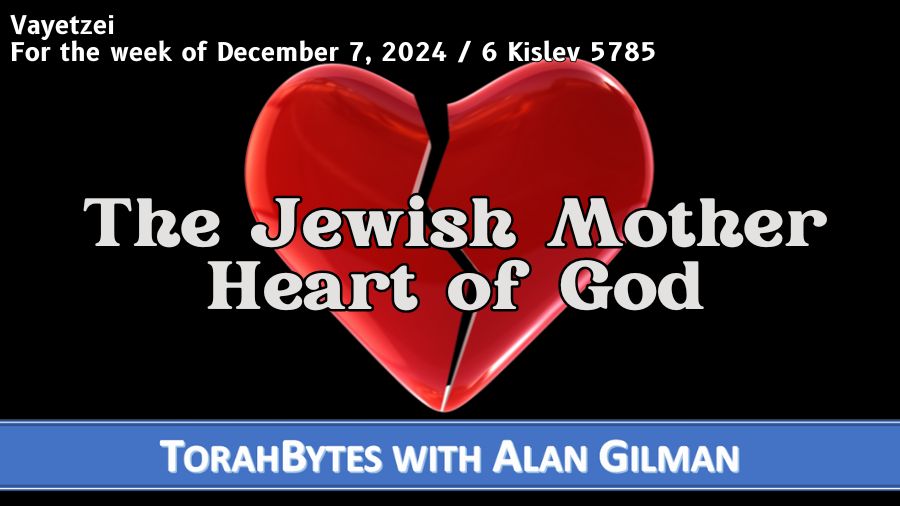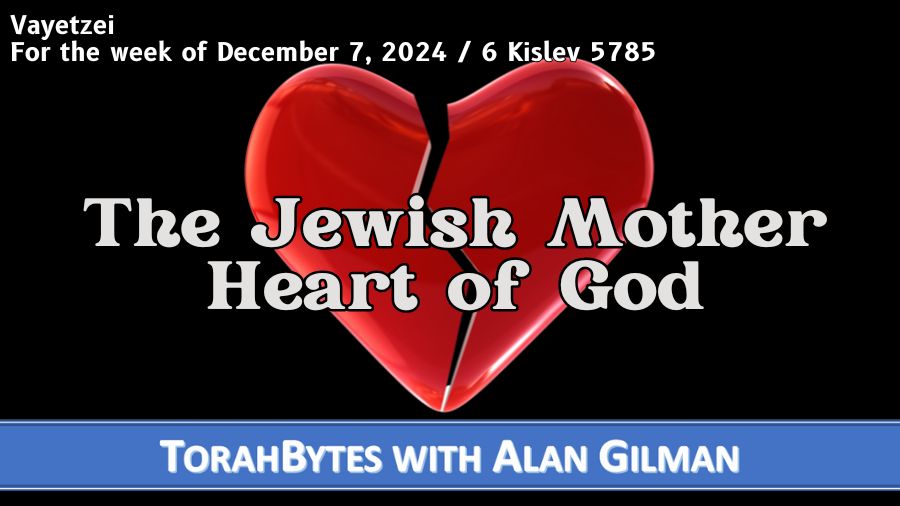
The Jewish Mother Heart of God
For the week of December 7, 2024 / 6 Kislev 5785

Vayetzei
Torah: Bereshit/Genesis 28:10 – 32:3
Prophets: Hoshea/Hosea 12:13 – 14:10 (English: 12:12 – 14:9)
I shall ransom them from the power of Sheol; I shall redeem them from Death. (Hoshea/Hosea 13:14)
Many years ago, I met a psychologist who, upon learning I was Jewish, made an interesting comment about God. He said in the books of the Hebrew prophets God was portrayed at times like a Jewish mother, talking to one of her adult children: “Why don’t you even call me! Go away, I hate you! Don’t talk to me. Come back; come back; I love you, I love you! So, when are you going to visit?” For the record, not all Jewish mothers are like that. My wife isn’t, but my mother, may she rest in peace, was.
But what about God? Was my new friend correct? Does God ever display an extreme, neurotic-like, perhaps contradictory, overwhelming, hard-to-understand love? Let’s look at this week’s Haftarah (a passage from the Prophets that accompanies the weekly Torah portion)—taken from the Book of Hoshea (English: Hosea) 12:13-14:10 in the Hebrew; 12:12 – 14:9 in most English translations. This was likely chosen because it includes a reference to this week’s Torah portion, including Jacob fleeing his brother’s vengeance by going to Mesopotamia.
Also included in this Haftarah are extreme words of judgment against Israel. That’s certainly a common theme throughout biblical prophetic literature. Here are a couple of examples:
Therefore they shall be like the morning mist or like the dew that goes early away, like the chaff that swirls from the threshing floor or like smoke from a window (13:3).
I will fall upon them like a bear robbed of her cubs; I will tear open their breast, and there I will devour them like a lion, as a wild beast would rip them open (13:8).
This section is so highly negative on Israel; the English Standard Version, which I am using here, uses the subheading “The Lord’s Relentless Judgment on Israel.” One dictionary definition of “relentless” is “showing or promising no abatement of severity, intensity, strength, or pace.” This sums up how many people characterize God’s take on rebellious Israel in the Hebrew Scriptures. Having done so much for them, these rebellious ingrates are worthy of nothing less than everlasting rejection. But like my friend’s characterization, there’s much more to God’s heart towards his chosen ones. A little further down, we also read:
I will heal their apostasy; I will love them freely, for my anger has turned from them. I will be like the dew to Israel; he shall blossom like the lily; he shall take root like the trees of Lebanon; his shoots shall spread out; his beauty shall be like the olive, and his fragrance like Lebanon. They shall return and dwell beneath my shadow; they shall flourish like the grain; they shall blossom like the vine; their fame shall be like the wine of Lebanon (14:4-8; English 14:4-7).
Can you see why my friend characterized God in the way he did? I wouldn’t blame someone who claimed the extreme difference between judgment and acceptance is so great as to be irreconcilable. My friend characterized God in the way that many Bible readers, not to mention the editors of the ESV, have great trouble doing.
What we see here is an outworking of what I like to call God’s dilemma. His covenantal relationship with the Jewish people is a complex one. Foundational to it are his unconditional promises given to Abraham, Isaac, and Jacob. It was this commitment that led to his rescue of their descendants many years later when they were enslaved in Egypt. His redemption of the nation at the hand of Moses led to an additional covenantal arrangement at Mt. Sinai that created a dynamic of blessings and curses based on the stipulations of that covenant. Israel’s humanity, shared with all nations, undermined their ability to meet God’s standards, setting them up for the kind of harsh judgment described by Hoshea. Yet, God’s dilemma was that he was at the same time obliged to uphold the original covenant he made with the forefathers even as he was required to enact judgment.
The tension of required punishment amidst an eternal commitment resulted in an almost neurotic expression of both anger and heartfelt yearning, which may not be that far from a stereotypical Jewish mother’s heart with its expectations and demands mixed with unshakable eternal love.
Tragically, instead of grasping the complex, hard-to-understand nature of God’s covenantal love, many attempt to smooth it out by choosing one of the two extremes. Either God is angry and vengeful, or he is absolutely accepting no matter what. We might think that either there is nothing we can do to ever satisfy him or there’s nothing we can do that will undermine his love. We wonder how God could be both absolutely demanding and loving at the same time.
I can’t explain how it works, but God has provided something in Scripture through which we can embrace the unexplainable—Israel. Certainly, it’s only by knowing God through the Messiah that his complex love can be known, but in order to grasp the complexity of that love, he has provided Israel as the example through which to demonstrate to the whole world a most truly effective and dependable love.
Now, of course, God is not a Jewish mother. But could it be that God instilled in the mothers of Israel, some of them at least, consciously or unconsciously, a concept of high demand and expectation mingled with everlasting love? But not being God, this tension has often led to great disappointment and broken relationships. The tension of high demand and committed love can tear a heart apart, even God’s, which is exactly what it cost him—through the Messiah—on behalf of us all.
Scriptures taken from the English Standard Version